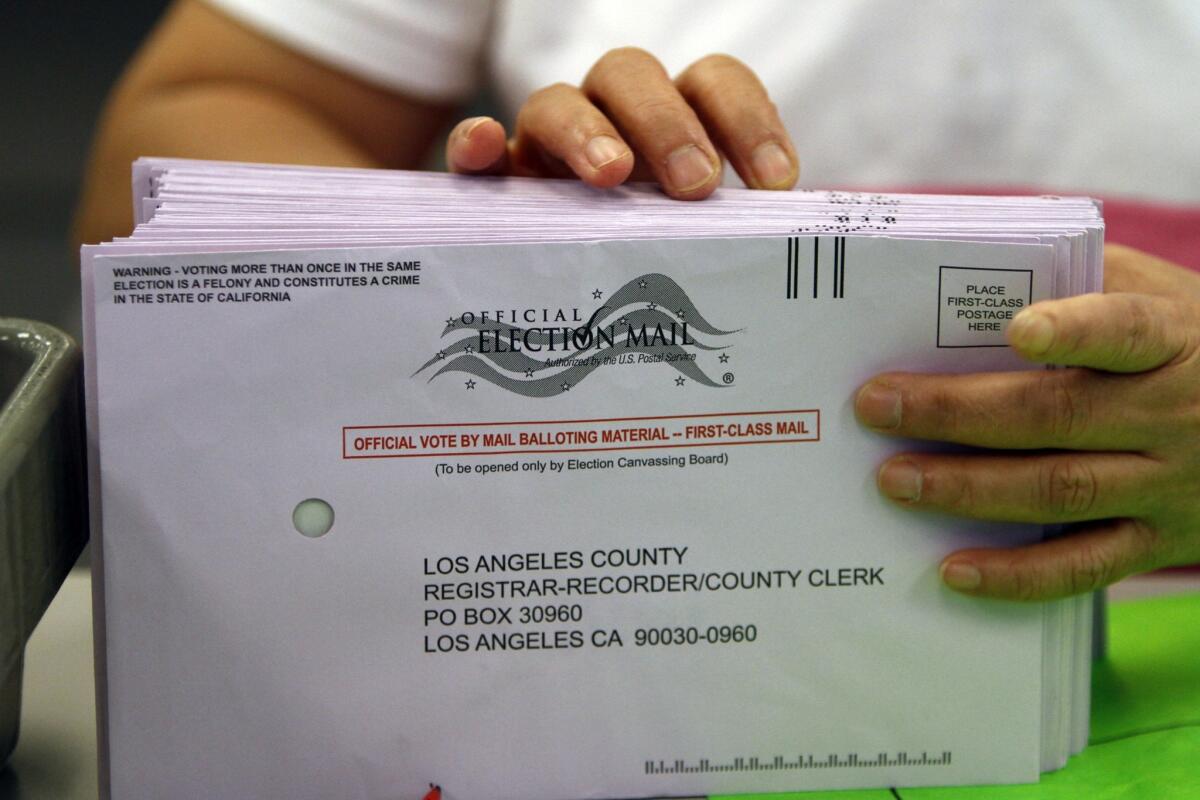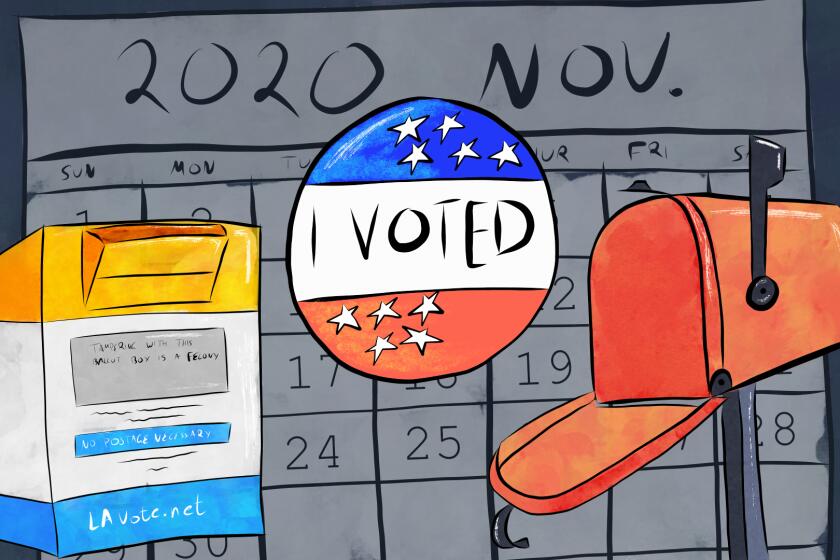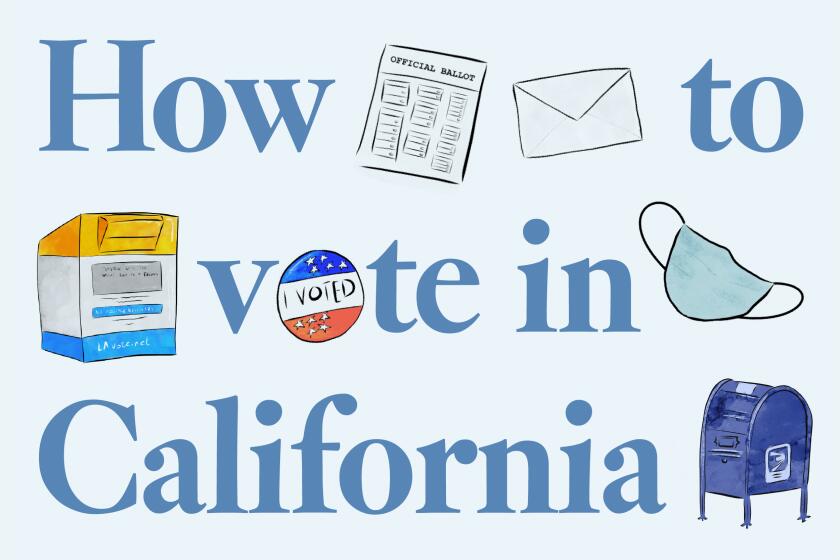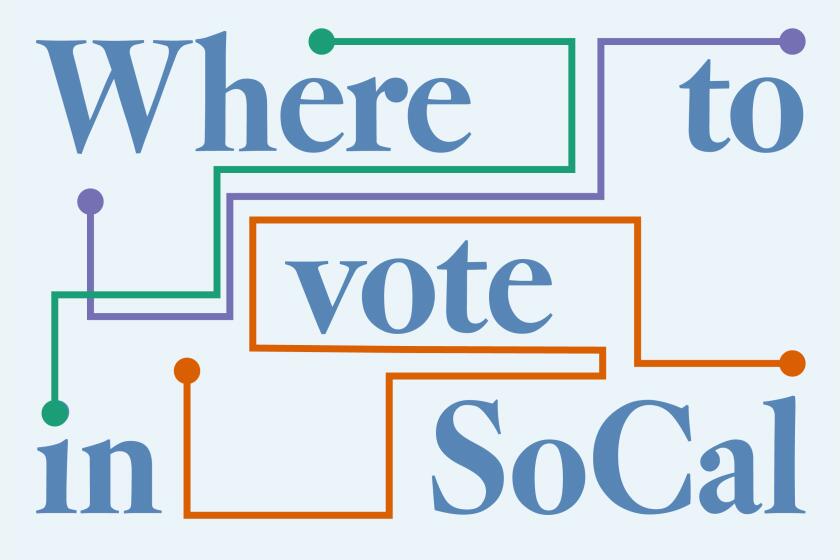More than 1 million California ballots already cast, shattering records

Election day is more than two weeks away, but more than 1 million Californians have already returned their mail-in ballots, according to the state, an amount that marks the most ballots collected by mail at this point in any state election.
Nearly half of the mail-in ballots come from Los Angeles County, where more than 435,000 voters have already responded, according to the L.A. County registrar-recorder’s office.
The flood of ballots announced by Secretary of State Alex Padilla still represents only a fraction of the 21 million sent to California voters under a new state mandate prompted by pandemic safety efforts, and it’s unclear whether the state’s turnout will ultimately eclipse past elections.
The huge numbers of mail-in ballots could make counting the votes more complicated and mean longer waits to determine the outcome of close races. This was the case in 2018, when it took weeks to call some key congressional races that ended up tipping the U.S. House back into Democratic control.
But the immediate response suggests voters are especially engaged amid a contentious presidential election and the disruption to work and education caused by the pandemic, experts say.
“Many families are at a breaking point and are likely taking their frustrations out at the ballot box,” said Shannon Murphy Castellani, principal at M Strategic Communications, a Los Angeles-based public affairs firm. “It’s clear voters are paying attention this election cycle.”
The surging mail ballot response in California reflects the nationwide trend, as voters have cast roughly 15 million mail ballots so far, according to the nonpartisan U.S. Elections Project. The increase also comes despite President Trump’s baseless claims that the process is vulnerable to fraud.
Some smaller states have even larger mail ballot return totals. The swing state of Florida has doubled California’s total, with nearly 2 million voters already casting their mail ballots, according to the project, which is managed by University of Florida political science Associate Professor Michael P. McDonald. Michigan voters have already cast 1.2 million, and Texas is closing in on one million. Those states are also already offering some in-person voting.
In California, this year’s focus on voting by mail came in May when Gov. Gavin Newsom ordered that ballots be sent to all the state’s registered voters. The state had been moving in the direction in recent years following passage of the Voter’s Choice Act, which created a new model similar to other Western states that have tried to make casting ballots more convenient for voters.
Fourteen counties, including Los Angeles, began using the model, which focused on sending ballots to all registered voters, expanding early voting and using vote centers, allowing residents more flexibility in where they participate.
Orange County has also seen a flood of early mail-in returns, with more than 100,000 ballots received so far, according to Paul Mitchell, vice president of Political Data Inc., a firm that tracks voter information in detail.
The information collected by Mitchell’s firm, which is known in the industry as a trusted data source, is sliced by demographics, geography, political party and age.
It appears that roughly 10% of voters who are 65 or older, for example, have already returned their mail-in ballots. Democrats have returned them at a slightly higher rate than Republicans, according to the data.

Mail-in ballots, registration deadlines, voting centers — we’ve got you covered with the basics of voting in the Nov. 3 election.
Political consultants such as Fiona Hutton of Los Angeles say their internal survey data are showing a high degree of intent and motivation to vote early. But whether all voters will follow through by completing and ultimately submitting their mail-in ballots is unclear.
“It’s going to be significantly more than we’ve seen before,” Hutton said. “Will it be historic? ... I’m not sure.”
That high level of engagement is represented by voters such as Rosie Manina, a Bay Area financial analyst who cast her mail-in ballot at a drop box.
She received her ballot a week ago and turned it in by Saturday, in what she said was the “fastest turnaround ever” for one of her mail-in ballots.
“I’ve never been so excited to vote in my entire life,” she said. “I wanted to make sure that my vote was in early, in part to relieve pressure on my registrar.”
Los Angeles County could feel that pressure. This year it sent more than 5.6 million registered voters mail-in ballots, not just those who requested them as in the past, posing a potential challenge for officials to process, mail and ultimately count them all.
Mike Sanchez, a spokesman for the registrar-recorder’s office, said the county is prepared to handle an anticipated increase in mail ballots. County Registrar-Recorder Dean Logan and other election officials across the state, Sanchez said, have been encouraging voters to cast their ballots early, both by mail and eventually in person.
Doing so could relieve pressure on in-person voting sites on election day and also help make the results clearer when the first results are announced, according to Sanchez.
“I’m not surprised. I’m encouraged to see voters returning vote by mail ballots,” Sanchez said, noting that voters can also use hundreds of secure drop boxes across the region to submit their ballots ahead of election day. “That’s our message. Don’t wait. You can return it the same day you receive it.”
While many local voters are voting early, others are still waiting.
William Bird, a Marina del Rey resident, said he received notice from Los Angeles County that his ballot had been sent on Oct. 4. Yet it still hadn’t arrived as of Tuesday, more than a week later, causing him to worry about whether postal officials were properly handling the mail. The U.S. Postal Service has been plagued in recent months by delivery delays amid operational changes ordered by Postmaster General Louis DeJoy.
“I’m worried about where the ballot is,” said Bird, who works in real estate. “Having a drop box doesn’t do me any good if you don’t have your ballot.”
Luis Alvarado, an L.A.-area Republican strategist, said he too was seeing greater voter interest and engagement.
He attributes that in part to frustration with Trump, who is unpopular in deep-blue California, but also to campaigns getting smarter in their tactics for educating voters on how to participate. He also said voters had more time to investigate ballot measures and candidates because of the pandemic.
“There’s greater enthusiasm,” he said. “The effervescence is totally seeping into the consciousness of the electorate.”
More to Read
Sign up for Essential California
The most important California stories and recommendations in your inbox every morning.
You may occasionally receive promotional content from the Los Angeles Times.














